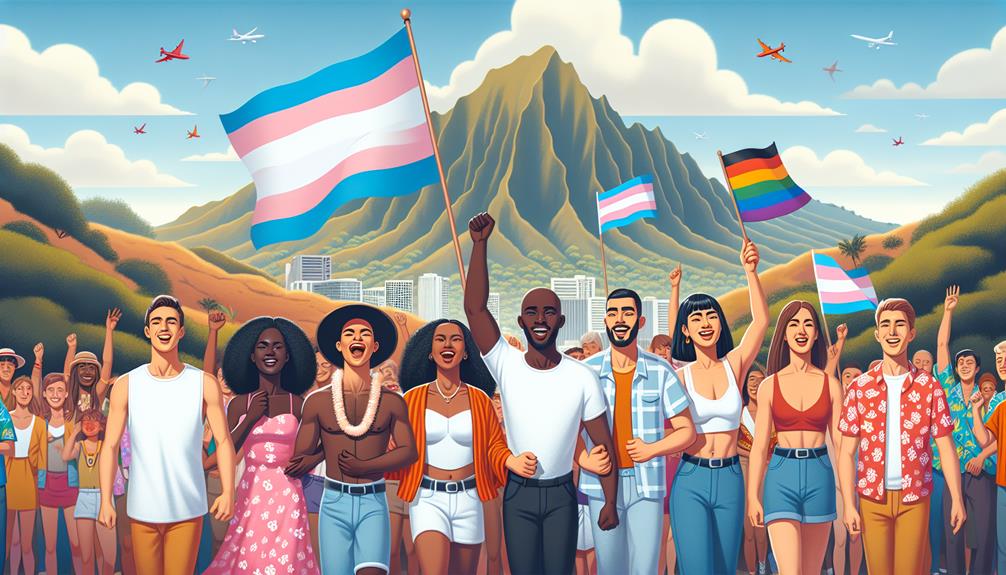Hawaii Transgender State of Affairs


Table of Contents
ToggleThe historical context of transgender identity in Hawaii reveals a complex interplay between indigenous traditions and the impact of European colonization on gender roles and identities. Native Hawaiians have long recognized a third gender identity, mahu, and trans and nonbinary individuals have historically held significant roles as teachers and leaders in their communities. However, the arrival of Christian missionaries led to the derogatory connotation of the term mahu. This clash between indigenous traditions and European constructs of gender roles has had a profound impact on the understanding of gender identity in Hawaii.
Despite this, Hawaiian culture has deeply rooted beliefs in a spectrum of gender and respect for trans and nonbinary individuals. The term mahu has gradually evolved over the last few decades. Moreover, Hawaii has a strong history of protecting transgender residents through legislative measures. The Hawai‘i Department of Health has been instrumental in affirming the importance of inclusivity and acceptance for all individuals, thereby addressing discrimination and health disparities experienced by gender-diverse people.
The resilience of these communities is evident in their efforts to overcome historical challenges and strive for a more equitable future.
Amid ongoing legislative efforts to safeguard the rights of transgender individuals in Hawaii, the legal landscape surrounding gender-affirming care has seen significant developments.
Governor David Ige signed a bill into law expanding gender-affirming care for transgender residents, clarifying that treatments insurers had deemed cosmetic should be covered as long as a medical provider deems them medically necessary. The law also requires insurers to give patients clear information about which gender transition services are covered, aiming to protect people from discrimination in accessing gender-affirming treatment.
This is a significant step forward in ensuring the health and rights of the transgender community in the state. It comes at a critical time when transgender individuals, particularly trans women, have faced high rates of claim denials, posing a threat to their well-being.
The Hawaii Public Health Department issued a statement acknowledging the importance of this law in addressing the disparities in accessing gender-affirming care, signaling a positive shift in the legal landscape for transgender individuals in Hawaii.
Struggles with healthcare access present significant challenges for transgender and gender-diverse communities in Hawaiʻi, leading to notable health disparities compared to cisgender people. The Department of Health believes that limited access to healthcare poses a significant public health threat to the gender-diverse community in Hawaiʻi.
Despite the recent positive legislative measures, such as the new law expanding gender-affirming care, there are still increasing attacks on transgender rights and public health. Gender-affirming care, including surgeries, voice therapy, and psychosocial resources, is crucial for transgender individuals but can be challenging and costly to access.
The Statement on Transgender Rights and Public Health highlights the need for comprehensive and nondiscriminatory healthcare services to improve the health and well-being of transgender individuals. Hawaii’s commitment to inclusivity and equality through legislative measures sets an example for other states and contributes to a more inclusive and accepting society.
The law aims to protect transgender individuals from discrimination and improve access to comprehensive gender-affirming healthcare services, positively impacting their mental and physical well-being.
Despite the persisting challenges of healthcare access, fostering a supportive community is essential for the well-being and inclusion of transgender and gender-diverse individuals in Hawaiʻi. Community support plays a crucial role in combating discrimination, transphobia, and other barriers faced by transgender individuals. It provides a sense of belonging, understanding, and solidarity, which are vital for their resilience and strength.
Engaging with the transgender community and promoting awareness can foster a more inclusive and affirming environment for all individuals. Acknowledging the importance of community support in public health and social well-being is imperative for creating a society where transgender and gender-diverse individuals can thrive.
Creating safe spaces for transgender and gender-diverse individuals to connect and share their experiences can provide a sense of belonging and support.
Offering resources and services tailored to the specific needs of transgender individuals, such as mental health support and legal assistance, can help address the challenges they face.
Educating the broader community about the experiences and needs of transgender and gender-diverse individuals can help reduce stigma and discrimination, fostering a more inclusive society.
Health disparities and limited access to healthcare continue to pose significant challenges for transgender and gender-diverse communities in Hawaii. Discrimination, particularly transphobia, remains a prevalent threat to the well-being of these marginalized populations. The Hawaii Department of Health is dedicated to promoting equitable opportunities for optimal health and well-being for all individuals, including māhūwahine, māhūkāne, transgender, and gender-diverse people.
Unfortunately, health inequity persists, leading to disparities in access to healthcare, bullying, interpersonal violence, depression, suicidality, and substance use among transgender and gender-diverse communities.
Despite ongoing challenges, Hawaii has demonstrated a commitment to transgender rights through legislative measures aimed at protecting against discrimination by insurance companies and prohibiting conversion therapy. The focus on promoting anti-bias and inclusion for all residents and employees underscores the state’s dedication to resilience and the well-being of transgender and gender-diverse individuals.
The public health nursing branch of the Hawaii Department of Health continues to work diligently to address these ongoing challenges, striving to create a society where transgender and gender-diverse communities have access to the same level of healthcare and support as their cisgender counterparts.
In Hawaii, the third gender identity, mahu, reflects the cultural acceptance and legal recognition of non-binary identities.
Gender diversity and expression are valued, with community support for identity affirmation and social inclusion.
Medical transition is an essential aspect of gender identity, highlighting the importance of comprehensive care for transgender individuals.
The recognition of third gender in Hawaii demonstrates inclusivity and acceptance, setting an example for other states to follow.
Māhū holds significant cultural and historical roots in Hawaii. The term encompasses a wide spectrum of gender, not limited to Western transgender identity. Māhū individuals historically held respected roles and are valued members of the community.
Understanding Māhū is essential for recognizing and respecting diverse gender identities in Hawaiian culture. It celebrates diversity, empowers individuals, and promotes social acceptance through inclusive language and modern acceptance.
The gender affirming care bill in Hawaii expands healthcare access for transgender individuals by ensuring coverage for medically necessary gender transition services. It aims to address healthcare disparities and protect transgender rights by requiring insurers to provide clear information about covered services.
This inclusive policy promotes legal recognition and supports the mental health of transgender individuals. It represents a significant step towards providing essential medical care and social support for those seeking gender-affirming treatment.
Changing one’s gender in Hawaii involves a multi-step process.
First, individuals need to obtain a court order approving the gender change.
Then, they must update their Social Security information, followed by their driver’s license and birth certificate.
Medical documentation and an affidavit of gender change are typically required.
While the process can be complex, it’s an important step for many individuals in affirming their identity.
In conclusion, Hawaii’s transgender state of affairs is a complex landscape of legal progress and ongoing challenges.
The recent law expanding gender-affirming care is a significant step forward, but the community still faces healthcare access issues, discrimination, and other difficulties.
Despite these obstacles, the Department of Health remains committed to promoting equitable opportunities for optimal health and well-being, and honoring the resilience and strength of gender-diverse individuals in traditional Hawaiian culture.
 Featured PostsJanuary 3, 2026Transitioning the Mind: The Emotional Labor of Becoming Yourself
Featured PostsJanuary 3, 2026Transitioning the Mind: The Emotional Labor of Becoming Yourself Featured PostsJanuary 2, 2026Beyond Barriers: The Resilient Journey of Transgender Youth
Featured PostsJanuary 2, 2026Beyond Barriers: The Resilient Journey of Transgender Youth Activism and ChangeJanuary 2, 2026The Price of Safety: Fleeing Anti-Trans Laws in the Lone Star State
Activism and ChangeJanuary 2, 2026The Price of Safety: Fleeing Anti-Trans Laws in the Lone Star State Featured PostsDecember 31, 2025Beyond the Headlines: The Full Impact of New Anti-Trans Laws
Featured PostsDecember 31, 2025Beyond the Headlines: The Full Impact of New Anti-Trans Laws